Unit 7 Know Our World Lesson 37 Let’s Learn Geography!课 件
文档属性
| 名称 | Unit 7 Know Our World Lesson 37 Let’s Learn Geography!课 件 | 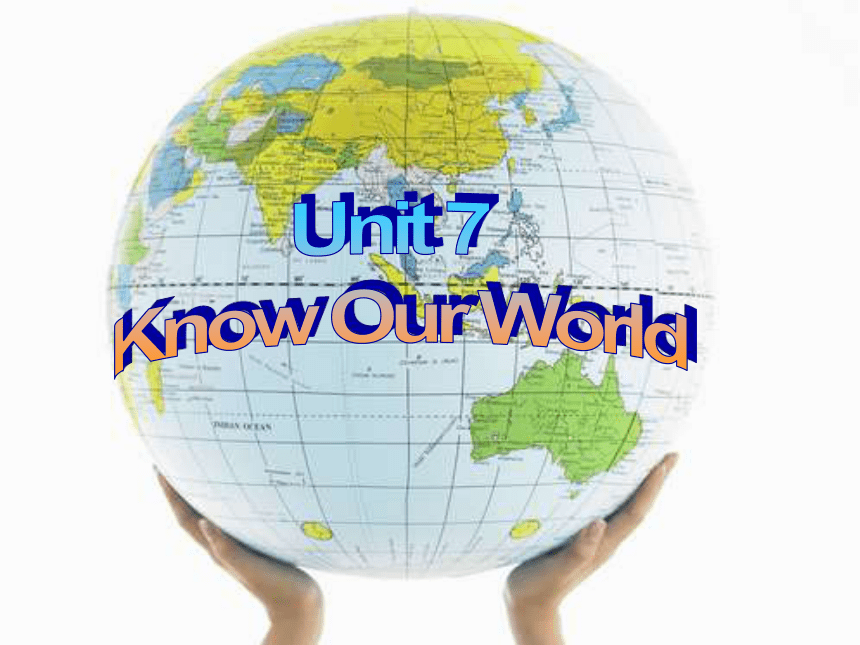 | |
| 格式 | zip | ||
| 文件大小 | 7.9MB | ||
| 资源类型 | 教案 | ||
| 版本资源 | 冀教版 | ||
| 科目 | 英语 | ||
| 更新时间 | 2018-04-12 14:20:45 | ||
图片预览



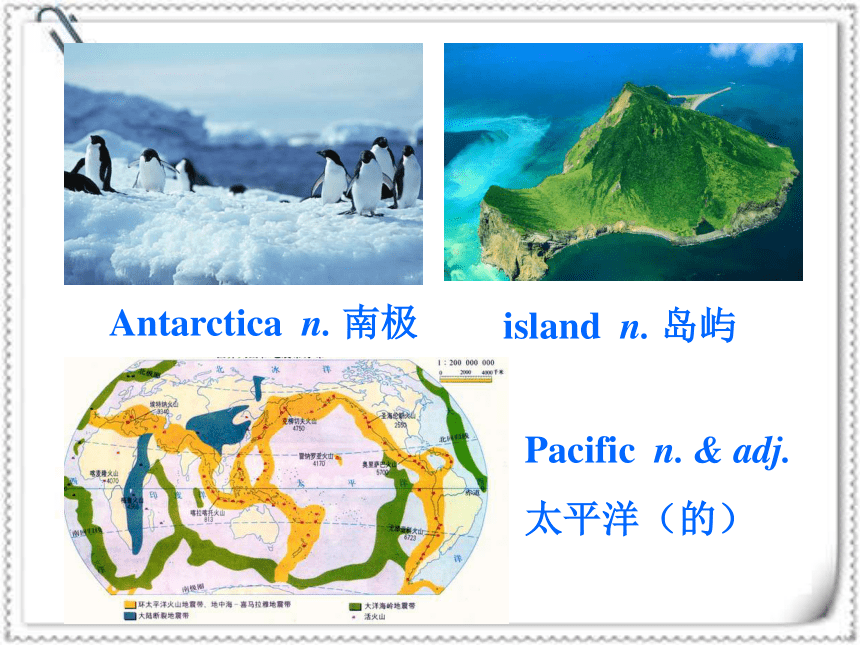

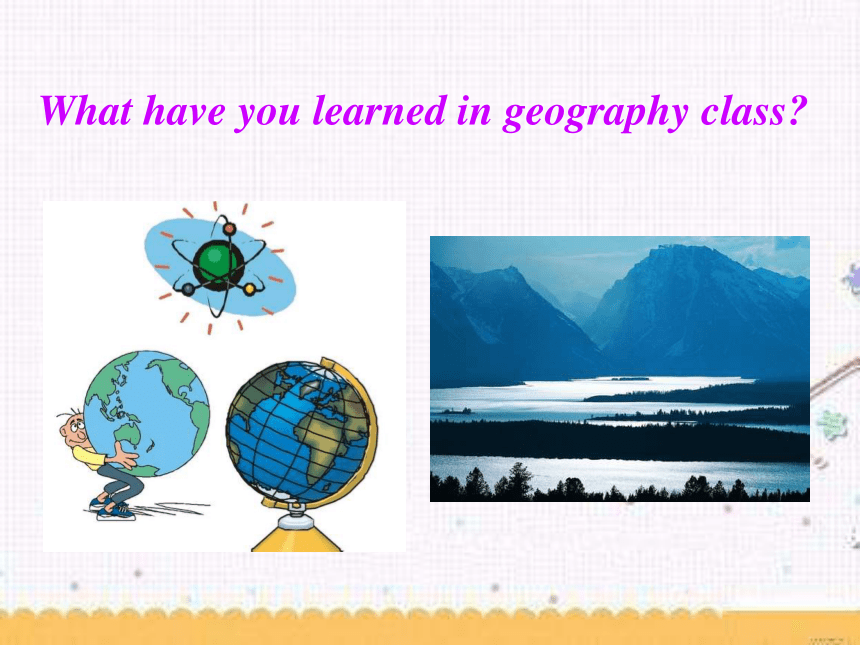

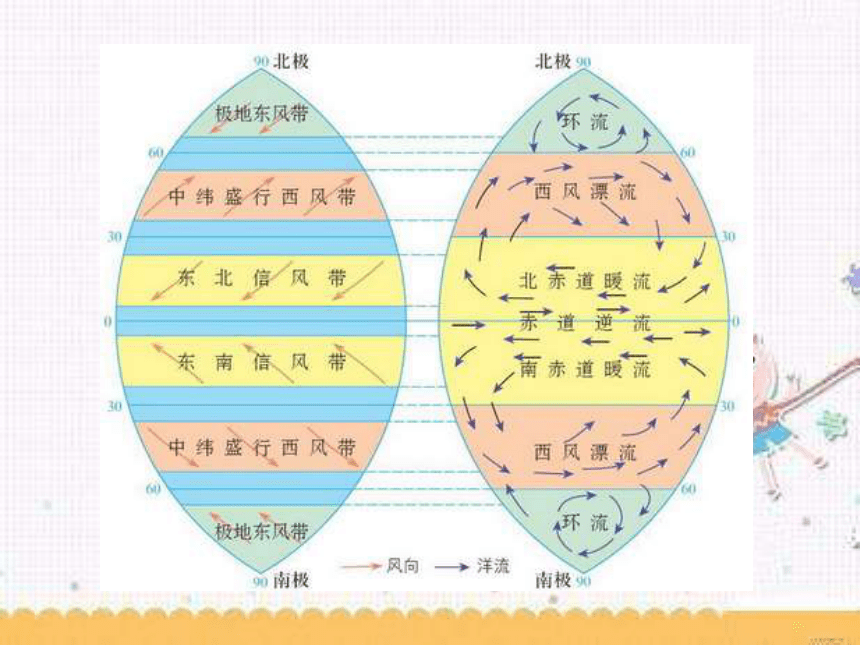
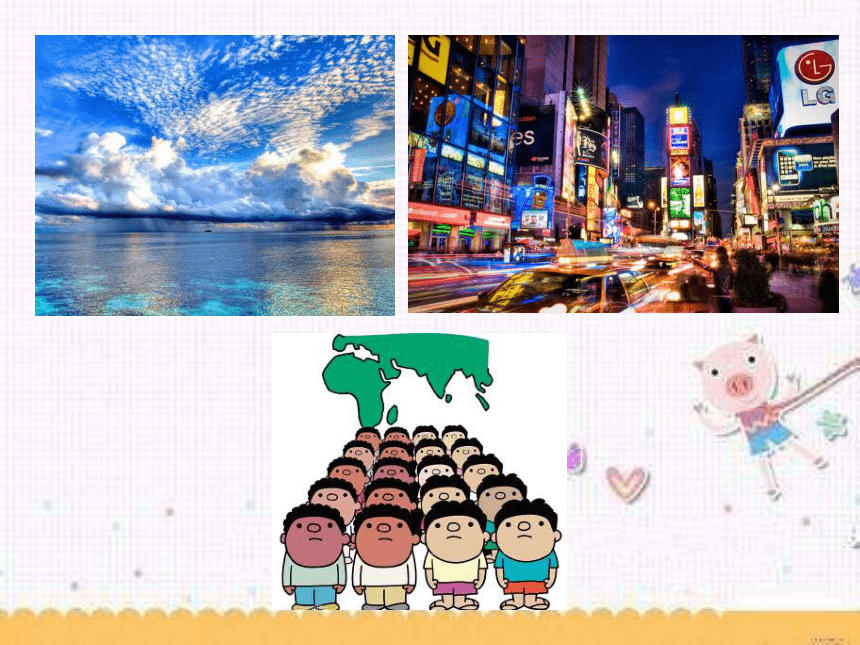
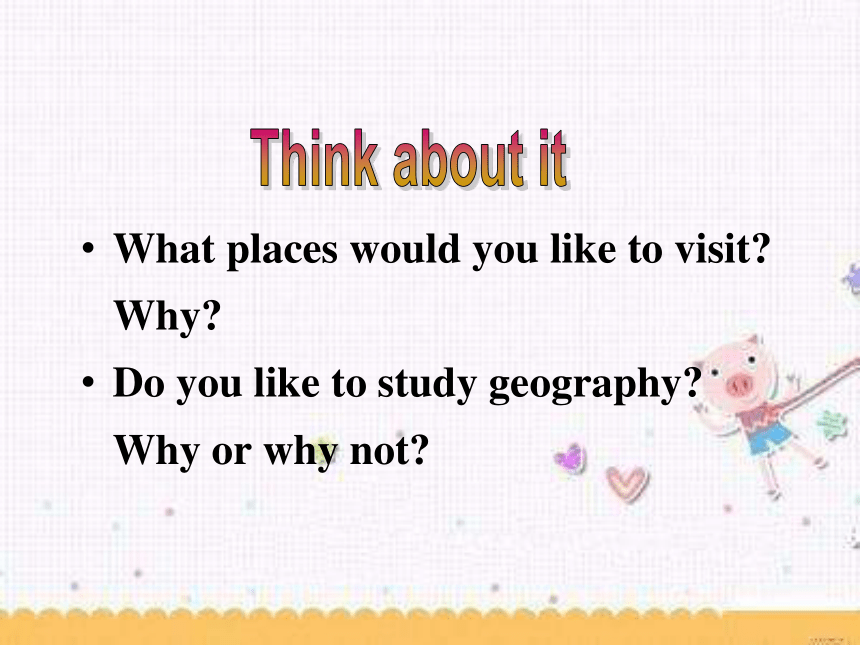
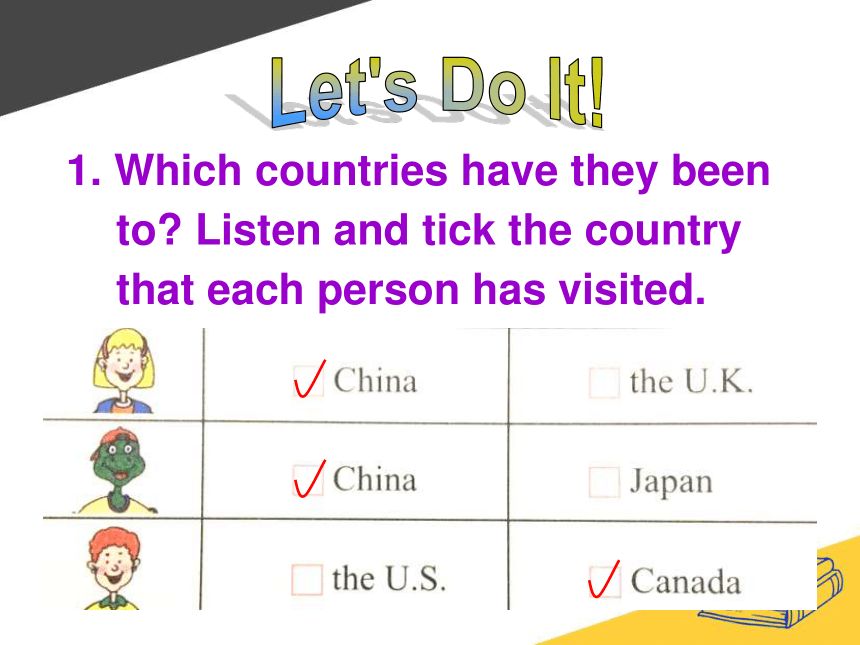
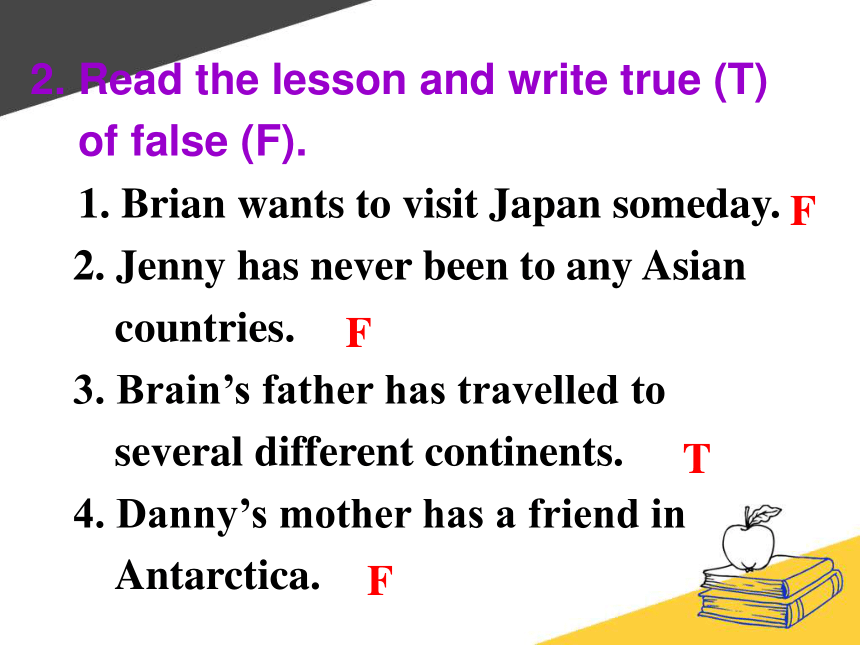
文档简介
课件33张PPT。Unit 7
Know Our WorldLesson 37
Let's Learn Geography!New wordsJapan n. 日本Japanese adj.
日本的;日本语Antarctica n. 南极island n. 岛屿Pacific n. & adj.
太平洋(的)Geography classWhat have you learned in geography class?What places would you like to visit? Why?
Do you like to study geography? Why or why not?Think about it1. Which countries have they been to? Listen and tick the country that each person has visited.Let's Do It!2. Read the lesson and write true (T)
of false (F).
1. Brian wants to visit Japan someday.
2. Jenny has never been to any Asian countries.
3. Brain’s father has travelled to several different continents.
4. Danny’s mother has a friend in Antarctica. FTFF Fill in the blanks with the words in
this lesson. The first letter is given.
1. A: Which country has the largest
p________?
B: China, of course.
2. A: Is Taiwan an i_____?
B: Yes. It is in the Pacific.populationisland3. A: I like all fruits e_____ bananas.
B: Really? I don’t like them, either.
4. Mr. Wang has gone a______, so I won’t see him this week.
5. The people in Japan speak J_______.exceptabroadJapanese1. Recently, we have learned about the population of the world.
population n. 人口
…has a population of … 有……人口
e.g. This city _____________ more than 1,000,000.?
这个城市人口超过一百万。 Language pointshas a?population?ofa) The population of China is very large.
___________________________b) The country has a smaller population than China.
_______________________c) What’s the population of China?
_______________________2. Have you ever been abroad, Danny?
abroad adv. 在国外
e.g. She worked abroad for a year.
He was famous, both at home
and_______. 他享誉国内外。
be abroad _____go abroad _____
他去国外了____________________
他去过国外两次了_______________
表达过去发生的动作对现在产生影响,或过去发生的动作一直持续到现在这两种情况时,常会用到现在完成时。
观察下面的例子,补全“结论”部分所缺的内容。Grammar:现在完成时a. Kate has already / just finished her homework.
b. I have never been to?Australia?before.
c. —Have you ever eaten fish and chips?
—Yes, I have. / No, I haven’t.
d.?Alice?hasn’t cleaned her room yet.
e. David has worked in the factory for five years.
f. They have lived here since 1995.[结论]
1.?观察以上例子可知,现在完成时由“助动词have / has +(1) ______________”构成。一般疑问句是直接把have /has提至主语前面;肯定回答:Yes,主语+have / has;?否定回答:No,?主语+haven’t / hasn’t.?如c;否定结构是在(2) ________后加not,如d。?动词的过去分词 have / has2.?由a-d可知,现在完成时表示过去发生或已经完成的某一动作对?(1) _____ (现在/过去)造成的影响或结果,常与already, just, ever, never, yet, before等副词连用。其中already, just, ever, never常位于(2) ________与(3)________之间,yet常用于疑问句或否定句的(4) ____。现在 ?have / has 过去分词 ?句末 3.?由e、f可知,现在完成时还可表示从过去某一时间开始,一直持续到现在的动作或状态(谓语动词必须是延续性动词)。常与for或since引起的时间状语连用;其中for后面接________,since后面接表示点时间的词语或从句。一段时间 have been to与have gone to
have been to后跟地点名词,表示某人“去过某地”,现在已经回来,常与twice, several times, ever和never等词语搭配。主语是第三人称单数形式时用has been to。
e.g. I have been to the zoo three times.
Dora has never been to?Beijing?before.have gone to后跟地点名词,表示某人“去了某地”,现在还没有回来,此时可能在途中或已经到了目的地。主语是第三人称单数形式时,用has gone to。
e.g. They aren’t in the classroom. They
have ____to the library.
—Where is Ellen?
—He has _____to Shanghai.【运用】
Complete the following sentences.
1. I have seen the movie before. (改为否定句)
I _______ _____ the movie before.
2. The concert has started. (改为一般疑问句)
_____ the concert _______?
3. Have you finished your homework?
(否定回答)
_____, I _______.?haven’t seen ?Has started? ?No haven’t 4.?我爸爸去过大连三次。
My dad ____ _____?____ Dalian?three times.
5.?怀特一家人不在家。他们去公园了。
The Whites aren’t at home. They _____ _____ _____ the park.
6.?我已经去过北京动物园好多次了。
I _____ _____ _____ Beijing Zoo several times.?has been to ?have gone to ?have been to What country or place are you most interested in ? Search the Internet and find some facts about it. Then share your information with the class.
Task tips:
Have you ever been there? What language do people speak there? Describe some places of interest. learn about one day except have been to have gone to
I love learning Geography. In geography class, we can __________ people and different cultures in different parts of the world. This week, my geography teacher is organizing us to get ready for our project--- spring outing. It's a good chance to step close to the nature. We ____________ many beautiful scennic spottings _______the seaside. Because it's a little far from here. My aunt __________ Hawaii this week. I hope ________I could go there too. It's my dream.learn abouthave been toexcepthas gone toone dayYou may choose one taskTask I Pairwork
A: Have you ever been to ____?
B: ____.
A: What language do they speak?
B: _____.
A:.... Task II Dialogue
Describe a place you have been to.
1. Where have you been?
2. How do you like that place ?
3. What language do people speak?
Read and AnswerTraveling to all corners of the world gets easier and easier. We live in a global village, but this doesn’t mean that we all behave in the same way.
How should we behave when you meet someone for the first time? An American shakes your hand firmly while looking you straight in the eye. In Thailand, people greet each other by pressing both hands together at the chest.
Many countries have rules about what you should and shouldn’t wear. In Muslim countries, women should wear long blouses and skirts .In Korea, you should take off your shoes when entering a house. Remember to place them neatly together where you came in.
Q1 How did people greet strangers in Thailand?
Q2 What should women wear in Muslim countries?
Know Our WorldLesson 37
Let's Learn Geography!New wordsJapan n. 日本Japanese adj.
日本的;日本语Antarctica n. 南极island n. 岛屿Pacific n. & adj.
太平洋(的)Geography classWhat have you learned in geography class?What places would you like to visit? Why?
Do you like to study geography? Why or why not?Think about it1. Which countries have they been to? Listen and tick the country that each person has visited.Let's Do It!2. Read the lesson and write true (T)
of false (F).
1. Brian wants to visit Japan someday.
2. Jenny has never been to any Asian countries.
3. Brain’s father has travelled to several different continents.
4. Danny’s mother has a friend in Antarctica. FTFF Fill in the blanks with the words in
this lesson. The first letter is given.
1. A: Which country has the largest
p________?
B: China, of course.
2. A: Is Taiwan an i_____?
B: Yes. It is in the Pacific.populationisland3. A: I like all fruits e_____ bananas.
B: Really? I don’t like them, either.
4. Mr. Wang has gone a______, so I won’t see him this week.
5. The people in Japan speak J_______.exceptabroadJapanese1. Recently, we have learned about the population of the world.
population n. 人口
…has a population of … 有……人口
e.g. This city _____________ more than 1,000,000.?
这个城市人口超过一百万。 Language pointshas a?population?ofa) The population of China is very large.
___________________________b) The country has a smaller population than China.
_______________________c) What’s the population of China?
_______________________2. Have you ever been abroad, Danny?
abroad adv. 在国外
e.g. She worked abroad for a year.
He was famous, both at home
and_______. 他享誉国内外。
be abroad _____go abroad _____
他去国外了____________________
他去过国外两次了_______________
表达过去发生的动作对现在产生影响,或过去发生的动作一直持续到现在这两种情况时,常会用到现在完成时。
观察下面的例子,补全“结论”部分所缺的内容。Grammar:现在完成时a. Kate has already / just finished her homework.
b. I have never been to?Australia?before.
c. —Have you ever eaten fish and chips?
—Yes, I have. / No, I haven’t.
d.?Alice?hasn’t cleaned her room yet.
e. David has worked in the factory for five years.
f. They have lived here since 1995.[结论]
1.?观察以上例子可知,现在完成时由“助动词have / has +(1) ______________”构成。一般疑问句是直接把have /has提至主语前面;肯定回答:Yes,主语+have / has;?否定回答:No,?主语+haven’t / hasn’t.?如c;否定结构是在(2) ________后加not,如d。?动词的过去分词 have / has2.?由a-d可知,现在完成时表示过去发生或已经完成的某一动作对?(1) _____ (现在/过去)造成的影响或结果,常与already, just, ever, never, yet, before等副词连用。其中already, just, ever, never常位于(2) ________与(3)________之间,yet常用于疑问句或否定句的(4) ____。现在 ?have / has 过去分词 ?句末 3.?由e、f可知,现在完成时还可表示从过去某一时间开始,一直持续到现在的动作或状态(谓语动词必须是延续性动词)。常与for或since引起的时间状语连用;其中for后面接________,since后面接表示点时间的词语或从句。一段时间 have been to与have gone to
have been to后跟地点名词,表示某人“去过某地”,现在已经回来,常与twice, several times, ever和never等词语搭配。主语是第三人称单数形式时用has been to。
e.g. I have been to the zoo three times.
Dora has never been to?Beijing?before.have gone to后跟地点名词,表示某人“去了某地”,现在还没有回来,此时可能在途中或已经到了目的地。主语是第三人称单数形式时,用has gone to。
e.g. They aren’t in the classroom. They
have ____to the library.
—Where is Ellen?
—He has _____to Shanghai.【运用】
Complete the following sentences.
1. I have seen the movie before. (改为否定句)
I _______ _____ the movie before.
2. The concert has started. (改为一般疑问句)
_____ the concert _______?
3. Have you finished your homework?
(否定回答)
_____, I _______.?haven’t seen ?Has started? ?No haven’t 4.?我爸爸去过大连三次。
My dad ____ _____?____ Dalian?three times.
5.?怀特一家人不在家。他们去公园了。
The Whites aren’t at home. They _____ _____ _____ the park.
6.?我已经去过北京动物园好多次了。
I _____ _____ _____ Beijing Zoo several times.?has been to ?have gone to ?have been to What country or place are you most interested in ? Search the Internet and find some facts about it. Then share your information with the class.
Task tips:
Have you ever been there? What language do people speak there? Describe some places of interest. learn about one day except have been to have gone to
I love learning Geography. In geography class, we can __________ people and different cultures in different parts of the world. This week, my geography teacher is organizing us to get ready for our project--- spring outing. It's a good chance to step close to the nature. We ____________ many beautiful scennic spottings _______the seaside. Because it's a little far from here. My aunt __________ Hawaii this week. I hope ________I could go there too. It's my dream.learn abouthave been toexcepthas gone toone dayYou may choose one taskTask I Pairwork
A: Have you ever been to ____?
B: ____.
A: What language do they speak?
B: _____.
A:.... Task II Dialogue
Describe a place you have been to.
1. Where have you been?
2. How do you like that place ?
3. What language do people speak?
Read and AnswerTraveling to all corners of the world gets easier and easier. We live in a global village, but this doesn’t mean that we all behave in the same way.
How should we behave when you meet someone for the first time? An American shakes your hand firmly while looking you straight in the eye. In Thailand, people greet each other by pressing both hands together at the chest.
Many countries have rules about what you should and shouldn’t wear. In Muslim countries, women should wear long blouses and skirts .In Korea, you should take off your shoes when entering a house. Remember to place them neatly together where you came in.
Q1 How did people greet strangers in Thailand?
Q2 What should women wear in Muslim countries?
同课章节目录
- Unit 1 Spring Is Coming
- Lesson 1 How's the weather?
- Lesson 2 It's Getting Warmer!
- Lesson 3 Sun Is Rising
- Lesson 4 The Spring City
- Lesson 5 Babysitting on a Spring Day
- Lesson 6 Stories about Spring
- Unit 2 Plant a Plant
- Lesson 7 Planting Trees
- Lesson 8 Why Are Plants Important?
- Lesson 9 Gardening with Mary
- Lesson 10 Make Your Garden Grow!
- Lesson 11 Amazing Plants
- Lesson 12 Danny's Plant
- Unit 3 Animals Are Our Friends
- Lesson 13 Danny's Big Scare
- Lesson 14 Amazing Animals
- Lesson 15 The Zoo Is Open
- Lesson 16 The Pear Escaped
- Lesson 17 Save the Tigers
- Lesson 18 Friendship Between Animals
- Unit 4 The Internet Connects Us
- Lesson 19 How Do You Use the Internet?
- Lesson 20 A Computer Helps!
- Lesson 21 Books or Computers?
- Lesson 22 Travel on the Internet
- Lesson 23 The Internet--Good or Bad?
- Lesson 24 An E-mail to Grandpa
- Unit 5 Buying and Selling
- Lesson 25 Raising Money
- Lesson 26 Cookies, Please!
- Lesson 27 Business English
- Lesson 28 Ms. Liu's Great Idea
- Lesson 29 How to Push a Product
- Lesson 30 A Cookie Sale
- Unit 6 Be a Champion!
- Lesson 31 Don't Fall, Danny
- Lesson 32 My Favourite Record
- Lesson 33 2800 Years of Sports
- Lesson 34 Modern Olympics
- Lesson 35 The Dream Team
- Lesson 36 Classroom Olympics
- Unit 7 Know Our World
- Lesson 37 Let's Learn Geography!
- Lesson 38 The World Is a Big Place
- Lesson 39 Ring Up or Call?
- Lesson 40 Body Language
- Lesson 41 A Class of the World
- Lesson 42 North America
- Unit 8 Save Our World
- Lesson 43 Let's Clean Up!
- Lesson 44 Environment Clubs
- Lesson 45 Let's Sort Garbage!
- Lesson 46 Protect Our Environment
- Lesson 47 Connected to Nature
- Lesson 48 Garbage Is Interesting!
